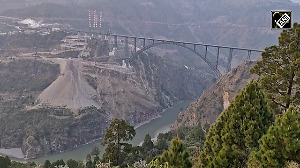A closure of the Indian mission in Kabul will be a Himalayan blunder at this historic juncture when the wheels of diplomacy and politics are set to accelerate in Afghanistan, argues Ambassador M K Bhadrakumar, who played a stellar role in beginning India's systemic dealings in Afghanistan in 1994.

The explosion of life is unstoppable.
The first buds are edging their roots from the dirt no sooner than Ashraf Ghani fled Kabul on Sunday, without telling anyone, carrying a massive loot of ill-begotten wealth stolen from his people.
And the green shoots of political recovery are appearing.
Tense and urgent care is needed. The region is rallying. Pakistan has taken the lead.
On Sunday afternoon, a galaxy of senior Afghan politicians, largely drawn from the erstwhile Northern Alliance of the late 1990s, arrived in Islamabad to cogitate with the Pakistani leadership regarding the mainstreaming of the Taliban.
The delegation comprised three top figures from Panjshir Valley, veteran Hazara leaders, the Jamiat-e Islami, Afghan parliament (including, interestingly, the eldest son of the Tajik leader from Mazar-i-Sharif Mohammed Atta Noor).
Without doubt, it is a spectacular development that Pakistan is hosting the top leaders of the erstwhile Northern Alliance, which spearheaded the anti-Taliban resistance in the 1990s. Put differently, with Ghani out of the way, the non-Taliban Afghan 'opposition' whom he had variously marginalised, humiliated or ignored during his maverick, corrupt dispensation, is surging.
By the way, Nikita Ishchenko, the Russian embassy spokesman in Kabul,has given on record a graphic account of Ghani's shameful escapade: 'As for the collapse of the (outgoing) regime, it is most eloquently characterised by the way Ghani fled Afghanistan.
'Four cars were full of money, they tried to stuff another part of the money into a helicopter, but not all of it fit. And some of the money was left lying on the tarmac.'
Equally, it is a stunning display of the crucial role only Pakistan can play in today's circumstances to facilitate national reconciliation in Afghanistan and nudge it towards the culture of inclusive politics.
Afghan politicians appreciate the significant shifts that have come over Pakistan's policies and its regional strategy that enhance its credentials to be peacemaker.
Pakistan urged the Afghan delegation to seek a broad-based and comprehensive political settlement of the Afghan issue and to commence a comprehensive political dialogue as immediate step aimed at creating a peaceful, united, democratic, stable country.
Alongside, Pakistan's national security council, the country's apex civilian-military policymaking body chaired by Prime Minister Imran Khan, reiterated on Monday that an inclusive political settlement is the only way forward, representing all Afghan ethnic groups.
Clearly, the developments in Islamabad cannot be seen in isolation. Amidst the botched-up evacuation of American diplomats from Kabul, President Biden underscored on Monday that in the period ahead in Afghanistan, the US hopes 'to lead with our diplomacy, our international influence, and our humanitarian aid'; will 'push for regional diplomacy'; influence the dynamics with 'our economic tools' while steering clear of 'nation-building'; and, 'maintain a laser-focus on our counterterrorism missions'.
It is an audacious speech. Biden held the ground on his controversial troop withdrawal decision. His grating roar was addressed to the domestic audience ,but what emerges from his speech is the melancholy retreat of America to concentrate on 'significant vital interests in the world that we cannot afford to ignore.'
To be sure, the locus of peacemaking has significantly shifted to the regional States. Taliban senses it and scrupulously refrains from precipitate actions.
Meanwhile, the 'coordinating group' of former president Hamid Karzai, Abdullah Abdullah and Mujahideen leader Gulbuddin Hekmatyar is acting as a bridge across the void created by Ghani's flight.
Inevitably, Pakistan has a centrality, but the role of Iran, China and Russia will also be important. The immediate effort is to create a transitional government. The Taliban appears to be amenable to a broad-based, representative arrangement.
India should summarily abandon its contrived narrative built on animus against Pakistan and recognise these new stirrings.
Liberated from the Faustian deal with Ghani and his circle as well as the American yoke, Indian diplomacy should renew networking with Afghan elites who were kept out of power.
A closure of the mission in Kabul will be a Himalayan blunder at this historic juncture when the wheels of diplomacy and politics are set to accelerate in Afghanistan.
Normal politics is poised to grow a little each day, and the dust of thirty years hanging lifeless in the air is going to settle down.
Retrenchment will only damage India's interests and isolate it in the region.
Ambassador M K Bhadrakumar, who headed the Pakistan-Iran-Afghanistan desk at the ministry of external affairs in the 1990s, served the Indian Foreign Service for 29 years.











 © 2025
© 2025